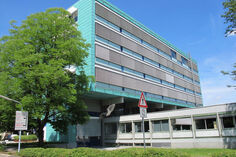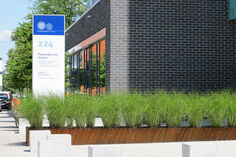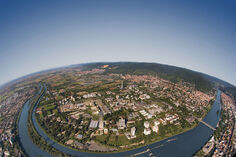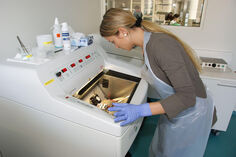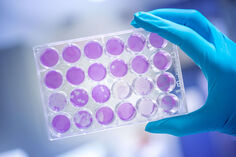PhD-Program of the Institute of Pathology
Participation in the PhD-Program is mandatory for students who want to obtain the doctoral degree at the Faculty of Biosciences in Heidelberg. The major aim of the program is to provide a scientific environment that allows the student to critically discuss his/her project with other scientists. In addition, the program is designed to improve the student's knowledge and experimental background beyond the scope of his/her own scientific project. For this reason, the program consists of different elements such as project reports, journal club and research seminar as well as 'electives', which allows the student to focus on additional and important aspects of science (e.g. scientific writing, animal courses).
The program is adjusted to a doctoral thesis work of about three years and only suitable for PhD students that work in one of the scientific groups located at the Institute of Pathology.
During the thesis, requirements must be fulfilled by the PhD-student and will be confirmed on the 'Certification sheet' (Blue sheet). The Blue sheet will be handed out after registration as student in the PhD-program of the Institute of Pathology.
- Each doctoral student has an assigned project supervisor who is also the direct contact person (project leader).
- In the first 2 months of his/her thesis work the student has to select two reviewers of the thesis. The reviewers agree by signature (first and second advisor).
- Within the first 6 months the student presents the project proposal to the project leader and the first advisor. Both scientists confirm the receipt of the proposal by signature.
- About 1.5 and 2.5 years after starting the thesis, the project leader and the first advisor will meet with the PhD-student and discuss his/her progress (oral and written project report). Both confirm the successful progress of the project by signature.
- Mandatory Elements (Block A)
- Journal Club: Regular participation in the weekly 'Journal Club' of the department. This also includes scheduled presentations of scientific publications. Participation will be confirmed by signature of the organizer every semester.
- Work in Progress Research Seminar: Regular participation in the weekly 'Work in Progress Research Seminar' of the department and scheduled presentation of his/her own experimental data. Participation will be confirmed by signature of the organizer every semester.
- Participation in Congress: Participation as a presenting author of a poster or oral presentation on a national or international scientific meeting. Confirmation by a copy of the abstract book and signature of the project leader.
- Elective elements (2 per semester, Block B)
- Scientific seminar series: Regular participation in the seminar series at the Institute of Pathology with invited external speakers. Participation will be confirmed by signature of the organizer every semester.
- Scientific retreat: Participation in a retreat incl. presentation of the work by the PhD student. Participation will be confirmed by signature of the organizer.
- Publication: One accepted publication as a first author (shared first authorship will also be accepted) in a peer-reviewed international scientific journal, which is related to the thesis.
- Workshops and further scientific training: The student can visit workshops and training courses that improve his/her scientific abilities (e.g. animal courses and method practicals) as well writing and presentation skills (soft skills) of the student. Participation will be confirmed by signature of the course/workshop organizer.
Fulfilment of the criteria will be checked by the program director (Kai Breuhahn) prior to application for thesis defence at the faculty of Biosciences.
Central registration in the Institute of Pathology:
Prof. Dr. Kai Breuhahn
University of Heidelberg
Institute of Pathology
Im Neuenheimer Feld 224
69120 Heidelberg
phone: +49-6221-4675
Kai.Breuhahn(at)med.uni-heidelberg.de
Further information can be found:
- Faculty of Biosciences: www.bio.uni-heidelberg.de/fakultaetbio/en/main
- www.uni-heidelberg.de/md/studium/download/promotionsordnung_matnat.pdf
